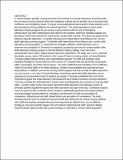| dc.description.abstract | In recent decades, globally, nursing instructors have tended to use skills laboratory in training skills for pre-service nursing students rather than traditional methods due to benefits such as increased self-confidence and competency levels. The basic nursing skills/procedures taught to these students are of great importance during initiation into clinical placement. This study attempted to assess skills laboratory training program for pre-service nursing students with the aim of identifying infrastructural and staff related factors that influence the program, determine strategies applied and perception of level of competencies acquired by a student after training. The study was guided by the following specific objectives: To identify infrastructural related factors that influence pre- service skills laboratory training program; To identify staff related factors that influence pre- service skills laboratory training program; To determine the strategies utilized in skills laboratory and To determine the perception on the level of competency acquired by pre-service nursing students after skills laboratory training program in Bomet Medical Training College. Semi-structured questionnaires were used to collect primary data from respondents. The study was a cross- sectional descriptive survey, where 150 students in the 1st year of study in nursing school, in Kenya Medical Training College, Bomet campus were systematically selected. The data was analysed using Statistical Package for Social Sciences SPSS version 22. Analysed data was presented using simple tables, percentages, pie charts and chi-square. The study established that simulation was an effective method of teaching skills in the skills laboratory. Students acknowledged peer teaching was also being utilized. In addition, pre-service nursing students agreed that they are able to collect specimens and take patient’s vital signs. From the findings, respondents agreed that skills laboratory area is adequate to accommodate at least 10 students per session. The study established that most of the respondents agreed that skills laboratory had equipment they needed to practice nursing procedures. The study revealed that skills laboratory trainers were knowledgeable and competent in training skills while. A small number of the respondents agreed that skills laboratory had adequate number of simulated patients equally few agreed that skills laboratory was open every day. Correlation analysis using chi-square at 95% confidence level; revealed a statistically significant association between teaching strategies and perception of competence; performance of skills and perception of competence; infrastructural and staff related factors and perception of competence. The study recommends that; NCK to implement structured skills lab training for pre-service nursing students; other skills lab teaching strategies like peer learning should be utilized more, it is an effective strategy as it ensures students engage more and relieves strained faculty staff. Nursing colleges should schedule daily and after 5pm access strategies to skill labs to enhance skills acquisition. | |

